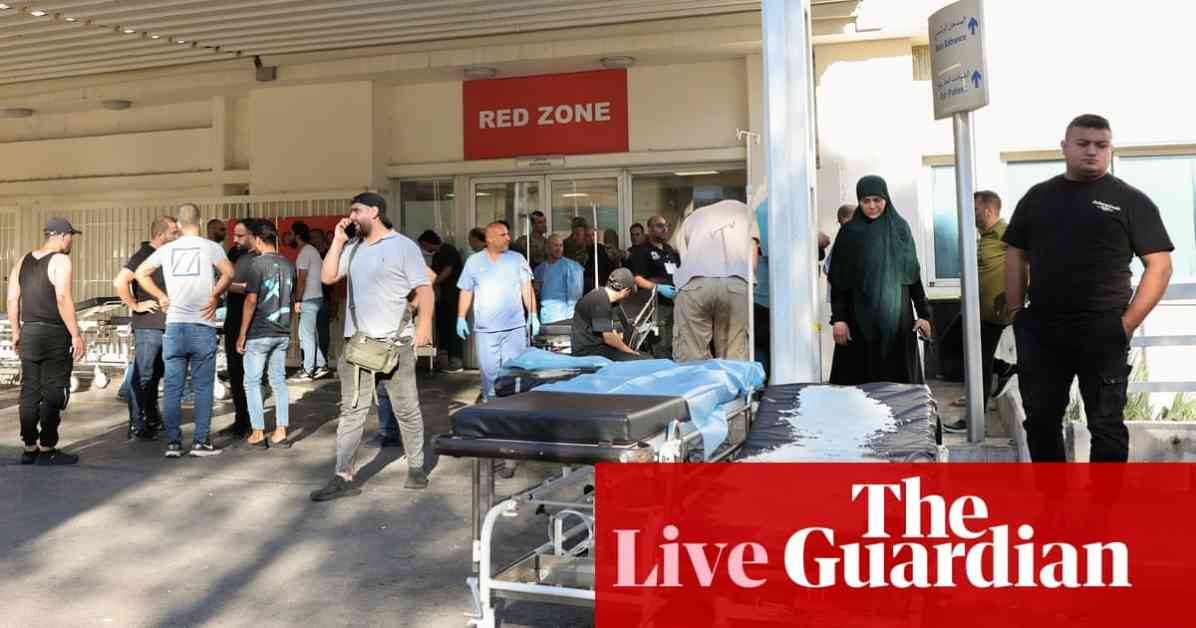**Hezbollah Accuses Israel of Responsibility for Deadly Pager Explosions in Lebanon**
Hezbollah has pointed the finger at Israel for the series of pager explosions that rocked Lebanon on Tuesday, resulting in the deaths of at least nine individuals and leaving thousands more injured. The militant group has vowed that Israel will face a “just punishment” for what it deems as a “criminal aggression.”
In a translated statement by AFP, Hezbollah stated, “We hold the Israeli enemy fully responsible for this criminal aggression.” The explosions, which targeted pagers used by Hezbollah members and affiliates, have raised tensions in the region and sparked fears of further escalation.
**Explosions Across Lebanon and Syria**
The wave of pager explosions was not limited to Lebanon, as reports emerged of similar incidents in Syria. The Syrian Observatory for Human Rights reported that 14 individuals were wounded in Damascus and its countryside due to exploding pagers linked to Hezbollah.
Lebanon’s health minister, Firass Abiad, confirmed that the death toll in Lebanon had risen to nine, with over 2,800 people sustaining injuries. Among the casualties was an eight-year-old girl from the Bekaa Valley, underscoring the devastating impact of the explosions on innocent civilians.
**International Response and Concerns**
The European Union’s top diplomat, Josep Borrell, has issued a stark warning, stating that “tomorrow is already too late” for a ceasefire in Gaza. Borrell emphasized the urgent need for pressure on both Israel and Hamas to reach an agreement to prevent further loss of life and a potential regional conflict.
The EU’s concerns were compounded by the events unfolding in Lebanon, with Hezbollah’s accusations against Israel adding to the volatile situation. The possibility of the conflict spilling over into Lebanon has raised alarm bells among international observers, highlighting the need for swift diplomatic efforts to de-escalate tensions.
**Hezbollah’s Losses and Calls for Justice**
Hezbollah suffered significant losses in the pager explosions, with reports indicating that several of its members, including fighters and medics, were among the injured. The group confirmed the deaths of three individuals, including a young girl, in the detonations that targeted their communication devices.
The tragic death of a 10-year-old girl in the Bekaa Valley, as her father’s pager exploded, serves as a poignant reminder of the human cost of the conflict. The son of a Hezbollah MP was also reported to have been killed in the blasts, further highlighting the personal toll of the violence.
**Lebanon’s Condemnation and UN’s Concerns**
Lebanon’s information minister condemned what he described as “Israeli aggression” in reference to the pager explosions, emphasizing the need to protect the lives and livelihoods of Lebanese citizens. The Lebanese government sees the explosions as a violation of its sovereignty and has called on the international community to address the escalating crisis.
The United Nations has expressed deep concern over the situation in Lebanon, describing it as “extremely volatile” and warning of the risks of further escalation. The civilian casualties and widespread injuries resulting from the explosions underscore the urgent need for a peaceful resolution to the conflict.
**Israel’s Alleged Role and Regional Implications**
Hezbollah’s accusations against Israel have intensified the longstanding animosity between the two adversaries, with both sides trading blame for the deadly pager explosions. The Lebanese government and Hezbollah view Israel as responsible for the attacks, citing them as a breach of Lebanese sovereignty.
The simultaneous explosions in Lebanon and Syria have raised fears of a broader regional conflict, with the potential for the war to spill over into neighboring countries. The escalating tensions between Hezbollah and Israel have put the entire region on edge, prompting calls for restraint and diplomatic intervention.
**Conclusion**
The deadly pager explosions in Lebanon have resulted in a tragic loss of life and widespread injuries, further exacerbating the already tense situation in the region. Hezbollah’s accusations against Israel have reignited longstanding hostilities between the two adversaries, raising concerns about the potential for further violence and instability.
As the international community grapples with the fallout from the explosions, urgent diplomatic efforts are needed to prevent a further escalation of the conflict and protect the lives of innocent civilians caught in the crossfire. The need for a ceasefire in Gaza and a de-escalation of tensions in Lebanon is more pressing than ever, as the specter of war looms large over the region.












